De Duitse schrijfster Irina Korschunow werd geboren op 31 december 1925 in Stendal in Sachsen-Anhalt. Zie ook alle tags voor Irina Korschunow op dit blog.
Uit: Langsamer Abschied
„Nun also soll Pierre begraben werden, draußen auf dem Einbeeker Heidefriedhof, mit kirchlichem Segen, und selbst als schon die Glocken läuteten, wusste ich noch nicht, ob es richtig war, was ich tat. »Für mich bitte kein Tamtam, nur die grüne Wiese und eine Gitarre mit Yesterday«, hatte er gelegentlich verlauten lassen, früher vor dem Unfall, als Sterben noch irgendwo im Abstrakten hing, nicht seine Sache. Doch dann, gegen Ende des großen Schweigens, hatte er angefangen, die Finger ineinander zu verschränken, erst sporadisch, allmählich häufiger, ein ehernes Bild, Pierre, der Leidensmann, bleich und erstarrt, die gefalteten Hände auf der Bettdecke.
Vielleicht nur eine leere Geste oder der Versuch, sich an sich selbst festzuhalten. Schwester Guda indessen, verantwortlich für das morgendliche Ritual, Säubern, Salben, Lagern und was der Körper sonst noch benötigte, um den Tag zu überstehen, bezeichnete es als Beten, »der Herr Professor betet wieder«, naheliegend für eine in die Jahre gekommene christliche Pflegerin, und keine Frage, dass sie unmittelbar nach seinem letzten Atemzug für eine kirchliche Beerdigung zu kämpfen begonnen hatte, mit dem Argument der gefalteten Hände, und vielleicht sei er im Verlauf seiner Heimsuchung ja längst wieder bei Gott angelangt, »darauf lassen Sie uns hoffen, Frau Nora«.

Irina Korschunow (31 december 1925 – 31 december 2013)
De Amerikaanse schrijver Nicholas Sparks werd geboren in Omaha, Nebraska op 31 december 1965. Zie ook alle tags voor Nicolas Sparks op dit blog.
Uit: Message In A Bottle
« Now he attended church regularly and actually served as a marriage counselor along with the pastor. What could he possibly say to someone doing the same things he’d done, she often wondered, and how could he help others if he hadn’t been able to control himself? She didn’t know, didn’t care, really. She was simply glad that he still took an interest in his son.
Naturally, once she and David had split up, a lot of her friendships ended as well. now that she was no longer part of a couple, she seemed to be out of place at friends’ Christmas parties or backyard barbecues. A few friends remained, though, and she heard from them on her answering machine, suggesting that they set up a lunch date or come over for dinner. Occasionally she would go, but usually she made excuses not to. To her, none of those friendships seemed the way they used to, but then of course they weren’t. Things changed, people changed, and the world went rolling along right outside the window.
Since the divorce there had been only a handful of dates. It wasn’t that she was unattractive. She was, or so she was often told. Her hair was dark brown, cut just above her shoulders, and straight as spider silk. Her eyes, the feature she was most often complimented on, were brown with flecks of hazel that caught the light when she was outside. Since she ran daily, she was fit and didn’t look as old as she was. She didn’t feel old, either, but when she looked in the mirror lately, she seemed to see her age catching up with her. A new wrinkle around the corner of her eye, a gray hair that seemed to have grown overnight, a vaguely weary look from being constantly on the run.“
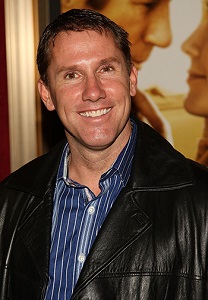
Nicholas Sparks (Omaha, 31 december 1965)
De Duitse dichter en schrijver Gottfried August Bürger werd geboren op 31`december 1747 in Molmerswende. Zie ook alle tags voor Gottfried August Bürger op dit blog.
Die Umarmung
Wie um ihren Stab die Rebe
Brünstig ihre Ranke strickt,
Wie der Efeu sein Gewebe
An der Ulme Busen drückt;
Wie ein Taubenpaar sich schnäbelt
Und auf ausgeforschtem Nest,
Von der Liebe Rausch umnebelt,
Haschen sich und würgen läßt:
Dürft’ ich so dich rund umfangen!
Dürftest du, Geliebte mich! –
Dürften so zusammenhangen
Unsre Lippen ewiglich!
Dann verschmäht ich alle Mahle,
Wie ich sie auf Erden sah,
Dann sogar im Göttersaale
Nektar und Ambrosia.
Sterben wollt’ ich im Genusse,
Wie ihn deine Lippe beut,
Sterben in dem langen Kusse
Wollustvoller Trunkenheit.
Amors Pfeil
Amors Pfeil hat Widerspitzen.
Wen er traf, der laß’ ihn sitzen,
Und erduld’ ein wenig Schmerz!
Wer geprüften Rat verachtet,
Und ihn auszureißen trachtet,
Der zerfleischt sein ganzes Herz.
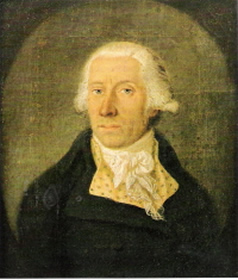
Gottfried August Bürger (31 december 1747 – 8 juni 1794)
Portret door Leopold Heinrich Friedrich Matthieu, 1774
De Schotse dichter Alexander Smith werd geboren op 31 december 1830 in Kilmarnock. Zie ook alle tags voor Alexander Smith op dit blog.
Glasgow (Fragment)
Draw thy fierce streams of blinding ore,
Smite on a thousand anvils, roar
Down the harbor-bars;
Smoulder in smoky sunsets, flare
On rainy nights; with street and square
Lie empty to the stars.
From terrace proud to alley base
I know thee as my mother’s face.
When sunset bathes thee in his gold,
In wreaths of bronze thy sides are rolled,
They smoke is dusky fire;
And, from the glory round thee poured,
A sunbeam like an angel’s sword
Shivers upon a spire.
Thus have I watched thee, Terror! Dream!
While the blue night crept up the stream.
The wild train plunges in the hills,
He shrieks across the midnight rills;
Streams through the shifting glare,
The roar and flap of foundry fires,
That shake with light the sleeping shires;
And on the moorlands bare
He sees afar a crown of light
Hang o’er thee in the hollow night.
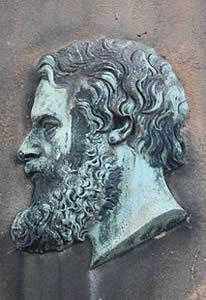
Alexander Smith (31 december 1830 – 5 januari 1867)
Portret op zijn graf
De Uruguayaanse schrijver Horacio Quiroga werd geboren op 31 december 1878 in Salto. Zie ook alle tags voor Horacio Quiroga op dit blog.
Uit: The Son (Vertaald door F. Wufferz)
“And he has not returned.The man goes back to his work, forcing himself to concentrate his attention on his task. It is soeasy, so easy to lose the notion of time inside the woods, to rest motionless for a moment on the forestfloor!Suddenly, the midday sun, the tropical hum, and the father’s heart stop at the same time. He has just begun to think: his son rests, motionless…Time has passed; it’s now twelve-thirty. The father leaves his workshop, and when he rests hishand on the mechanic’s bench, the pistol shot rises in his memory. In an instant, for the first time in thelast three hours, he considers that he has heard nothing else since the shot from the Sainte-Etienne. Hehas not heard the stony ground moving along under a familiar footstep. His son has not returned, and Nature finds herslef help up on the edge of the forest, waiting.A shot, a single shot has rung out, and that was a while ago now. After it, the father has notheard a sound, has seen neither a bird nor a single person, and has not crossed the opening to anouncethat great misfortune awaits he who crosses the wire fence…Head up and without machete, the father begins to walk. He cuts through the opening of spartagrass, enters the scrub, skirst the line of cacti without coming across the smallest trace of his son.But Nature continues, motionless. And when the father has covered the hunting paths he knowsand explored the swamp in vain, he becomes certain that each step forward is taking him, terribly andinexoribly, to his son’s dead body.Sadly, he cannot bring reproach on himself. Only the cold reality, terrible and consummate: hisson has died as he was about to cross…But where, in what part! There are so many fences there, and the scrub is so dirty – oh, verydirty! How little care he takes not to cross the wires, gun in hand!“
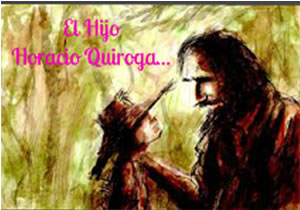
Horacio Quiroga (31 december 1878 – 19 februari 1939)
Illustratie door Maria Jose Duque
De Duitse schrijver en musicus Stephan Krawczyk werd geboren op 31 december 1955 in Weida in Thüringen. Zie ook alle tags voor Stephan Krawczyk op dit blog.
Uit: Steine hüten
„Noch heute, nach mehr als elf Jahren, werde ich von mir Unbekannten gefragt, wie das damals eigentlich war: Ich sei doch im Knast gewesen und dann in den Westen abgeschoben worden – bestimmt hätte man mich schon oft gebeten, mal ausführlich über die Dinge zu sprechen, und sicher habe ich mich auch schon häufig wiederholen müssen – aber sei nicht zu verstehen, dass man selten die Gelegenheit hat, einem gegenüberzustehen- oder zu sitzen, den man nur aus dem Fernsehen kennt? „Wie lange waren Sie denn im Gefängnis?“
Mit meinen fünfzehn Tagen kann und will ich nicht angeben. Ich wiegele ab: „Nicht viel. Zwei Wochen. Es war eine Erfahrung.“ Gerade Frauen sagen dann oft: „Zwei Wochen! Das würde ich nicht aushalten.“
Wie dünnhäutig diese Frauen sind, zeigt folgende Begebenheit: Tirana, die Hauptstadt Albaniens, hatte mich zum Gesang gerufen. Mir wurde ein Dolmetscher zugesellt, der mich vor dem Konzertabend auf drei ältere Herren hinwies, die gehört hätten, ich sei in Deutschland als Politischer im Gefängnis gewesen und mich deshalb kennenlernen wollten, weil sie diese Erfahrung in Albanien ebenfalls gemacht hatten. Drei heitere kleine Männer winkten mir vom Saaleingang zu. Nicht dass ich mich mit meiner bescheidenen Tageszahl auf die Begegnung gefreut hätte – natürlich wurde danach zuerst gefragt. Auf die Übersetzung meiner Antwort reagierten sie zuerst, als hätten sie sich verhört. Dann lachten sie sehr verschmitzt und einer fragte: „Ja, lohnt sich das denn überhaupt?“ Mein Dolmetscher sagte mir auf dem Rückweg, dass ich gerade 117 Jahren Knast gegenübergestanden habe.“
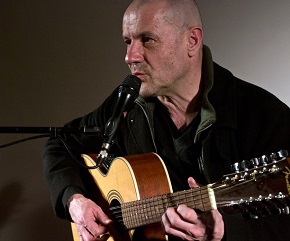
Stephan Krawczyk (Weida, 31 december 1955)
